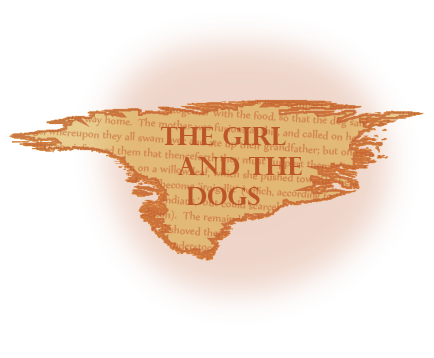
Greenland
The Girl and the Dogs
A man had a daughter with whom he lived alone at the winter hamlet. The girl rejected the advances of every suitor, stating that her father would not allow her to marry; but a dog once came to the hamlet, by whom the daughter had progeny, ten in number, half of whom had upper parts like men, but limbs and feet like dogs, the other half contrasting with the first ones in that their upper portions were dogs and their legs human. Despite this, the girl’s father fetched the offspring from the mountain behind the hut and brought them up like ordinary children, employing these monsters, when old enough, in carrying his kajak, clothing, and implements to and from the dwelling and the beach. When, however, it occurred to him that his grandchildren might possibly exhaust all his resources, he turned both them and their parents (the girl and the dog) out on a barren island, but nevertheless permitted the dog to swim to the mainland occasionally and fetch a little food for the family, for which purpose the wife was wont to hang a pair of women’s boots about his neck. Ere long, however, the grandfather was loth to fulfill his new compact, and therefore on one occasion placed stones in the boots together with the food, so that the dog sank and was drowned on the way home. The mother was furious at this, and called on her sons for revenge; whereupon they all swam over and ate up their grandfather; but on returning thereafter she informed them that thenceforth they must support themselves. There and then she placed half of them on a willow leaf, which she pushed towards the land, crying, ‘Now, you can sail to the land and become ‘irqigdlit’ (which, according to the present interpretation of the word, means ‘Indians,’ but could scarcely have had this signification in the days of the origin of the tradition). The remainder she placed on the sole of an old shoe which she had already charmed, and shoved them out seawards, crying, ‘You may go off from shore and become ‘qavdlunait’ (now understood as ‘Europeans,’ but which could hardly have had this meaning in the days of the origin of the tale), ‘and there,’ she is said to have continued, ‘you can learn to take care of yourselves and make beads and many pretty little articles.’
Source: Here